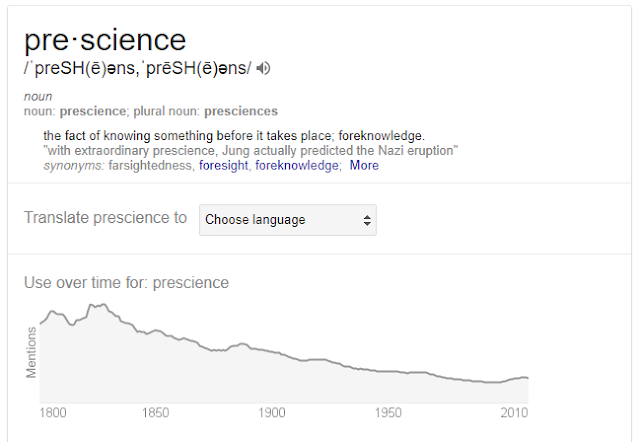 |
| A screenshot from my Google search for the definition of "prescience" - this expanded version includes an Ngram analysis |
Except for a minor uptick in the past few years it's a two-century downtrend, as displayed by the Ngram viewer, which tracks vocabulary frequency as used in the English-language books Google has scanned as part of Google Books. I had to wonder - does the shape of the graph add evidence to the societal trend of rejecting logic and science, and thus an eye to the future? (A quick interpretation of the word "prescience" as printed on a page or screen may lead to thinking the word is an expression of the world before science, i.e. "pre-science", but I will treat that as a coincidence, while sure there is an etymological explanation.) But with the trend with the word's usage, are we witnessing the downplaying the value of visions of the future?
I decided a little research was called for. I was in the middle of reading Bad Blood and that saga surely shows the value of a vision can be overdone. Elizabeth Hughes' idea that in the near future a drop of blood from a finger stick could be used for myriad blood tests was easy to see, but impossible to execute, at least in the recently ended lifespan of her company, Theranos. Going back farther, I tried to remember who mocked "the vision thing" and it turned out it was during the successful 1988 presidential campaign of George H.W. Bush. I even remember as a quite young kid that a prescient (there I go) aunt forecasting someday soon that our drive down Interstate 5 would be accessible only by attaching your personal vehicle (car) to a rail, to be safely and quickly pulled along.
While that 50-plus-year-old forecast about hooking passenger cars to rails could be seen as "foreknowledge" of the upcoming autonomous car revolution, it could also be interpreted as missing the mark. With "prescience" trending down ("foreknowledge" too), what about that adjective form, "prescient" that I just found the need to use in the previous paragraph? Well, it's doing all right - as can be seen from the Ngram graph just below. Leading to the conclusion that my quick analysis about the status of the importance of vision into the future might just be all about how and what words are used to describe it.
Comments